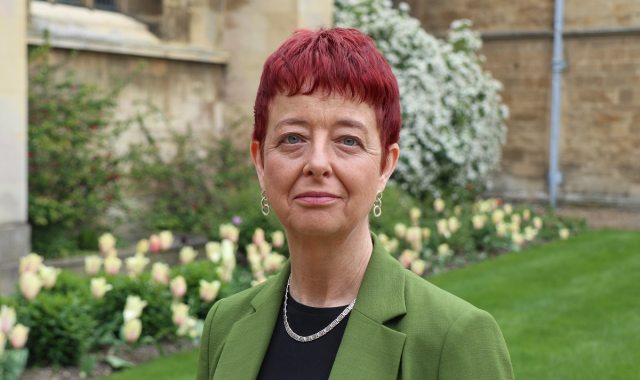Master of the Rolls
- 02 June 2021
- 4 minutes
The Right Honourable Sir Geoffrey Vos (Law 1973) is the Master of the Rolls, the most senior judge in England and Wales after the Lord Chief Justice. Sir Geoffrey shares the story of his career and his formative years at Gonville & Caius College.
After receiving his offer to read Natural Sciences at Gonville & Caius College, a 17-year-old Geoffrey Vos travelled to Kenya to work as a science teacher.
Six months prior to matriculation, he composed a letter in Nairobi to be sent by Air Mail to the College. “The rest, as they say, is history,” Sir Geoffrey says now, as the Master of the Rolls, the head of civil justice and the Court of Appeal in England and Wales.
He adds: “I asked if I could do something other than science – I really thought I’d done science by that time, after all I was 17 and a half!
“They sent me a little grey book, which I’ve still got. It contained about 10 lines on each subject offered in the Cambridge Tripos and I flicked through… Anglo-Saxon, Land Economy, thought ‘no, maybe not’, got to Law.
“I read the 10 lines, and I thought ‘maybe I’d like to be a barrister’. I’d heard what a barrister was – there were no lawyers in my family – and the same day I wrote another letter to the Admissions Tutor, and I asked to do Law. They wrote back and said yes. I never discussed it with anybody, I never took any advice. It worked out.”
He was called to the Bar in 1977, fulfilling the idea fostered in Kenya, but was denied the opportunity to complete his LLB after graduating by a direct examination clash with the Bar Finals.
Sir Geoffrey’s long and distinguished career saw him become a High Court Judge in 2009, Court of Appeal Judge four years later, and then Chancellor of the High Court in 2016. As Master of the Rolls, Sir Geoffrey is the Senior Judge in the Court of Appeal – the highest court except the UK Supreme Court – and deals with final appeals in the vast majority of cases.
He is also the Chair of the National Archives Advisory Committee, and the Master and Keeper of the Records of England, which is not a sinecure, but a responsibility. He is Chair of the Magna Carta Trust and a Commissioner for the National Debt, among other ex-officio roles.
Sir Geoffrey is the 98th Master of the Rolls
Sir Geoffrey is the second Caian to be Master of the Rolls, a position which began in 1283 and includes among his 97 predecessors Thomas Cromwell “who had more trouble than hopefully I’m going to have”.
The first Caian to be Master of the Rolls was Lord Esher, from 1883 to 1897, and Sir Geoffrey recalls with fondness how this was marked in the Caius Boat Club.
He says: “There was a letter up in the changing rooms at the Boat Club, from Lord Esher to the first Caius boat, which said: ‘Dear Caius First Boat, when I was at my dear old Caius, wot you are now…’ and then he reminisced about something and said ‘I’m the Master of the Rolls. Love, Lord Esher’. I always remember that letter because of the spelling of the word ‘what’.”
Sir Geoffrey is a forward-thinking member of the judiciary. He is a paperless judge – working entirely digitally – and is keen to create an integrated online justice system. He has worked on crypto-currencies and dispute resolution in the blockchain space, including publishing rules which will provide arbitration for digital transactions.
He adds: “I want to see the UK, post-Brexit, offer a go-to state-of-the-art, technologically-based dispute resolution which can update the old fashioned way we’ve done things in the past.
“It’s incredibly important that the justice system is brought into the 21st century, because otherwise people will simply not have sufficient access to justice.”
It’s incredibly important that the justice system is brought into the 21st century, because otherwise people will simply not have sufficient access to justice
The Covid-19 pandemic has provided a boost to the use of technology in the justice system, with virtual communications allowing civil justice to continue throughout. Some cases are being heard in court now the pandemic is easing, but the change will be a lasting one.
There is plenty of work to do in the next four years. The compulsory retirement age is 70, when Sir Geoffrey expects to retreat to the farm in Herefordshire he has nurtured for the last 28 years, and to spend more time with his wife Vivien and family, including his grandchildren.
He expresses sympathy for undergraduates denied the social experience he enjoyed, which centred around socialising, acting, and rowing.
Sir Geoffrey was a cox as a student, and then a coach as a graduate, helping Caius move up the river in both Lent and May Bumps, although as the first boat was reaching Headship, it was mutually decided he should step aside for a more professional approach to rowing.
He plans to leave an impression on the Boat Club, like Lord Esher, by continuing his correspondence with Caius by letter.
He says: “I’ll make sure I write a letter to the Caius Boat Club at same stage which starts ‘when I was at my dear old Caius, wot you are now’…”


